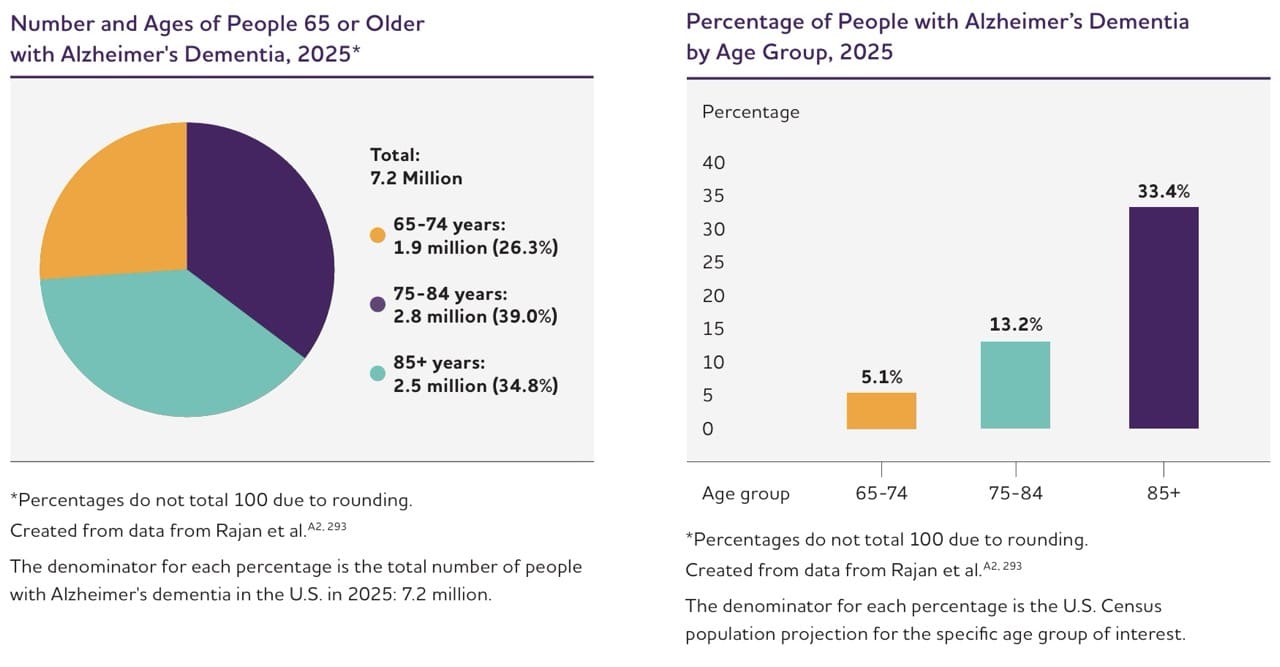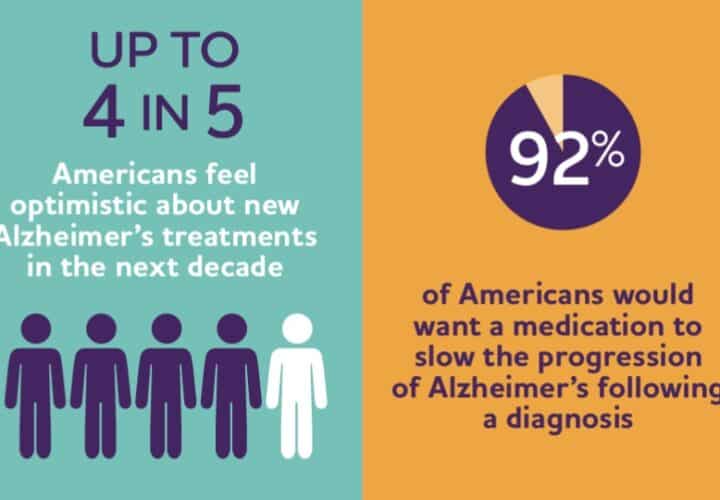The Alzheimer’s Association’s latest “Facts and Figures” report finds most Americans want early screening and access to disease-modifying drugs — even at high cost and risk.
For the first time, the number of Americans living with Alzheimer’s disease has topped 7 million. According to U.S. Census Bureau Data, the country’s population is up year over year by about 1 percent, but its number of Alzheimer’s diagnoses has grown at more than four times that pace. This is according to numbers in the Alzheimer’s Association’s latest annual report.
Every year, the association commissions its “Facts and Figures” survey, which attempts a picture of the disease in the U.S., and how it’s affecting individuals and families, private and public finances, and clinical and research medicine. With the advent of improved screening, earlier detection, and new therapeutics that can slow progression, the 2025 “Facts and Figures” results show that, while Alzheimer’s diagnoses are growing more common, there’s also a shift in response from patients: Survey respondents overwhelmingly indicated that they would prefer to handle Alzheimer’s proactively, favoring early diagnosis and new Alzheimer’s treatments—even if they come with risk.
“We’re seeing a major shift in people’s attitudes,” Elizabeth Edgerly, PhD, senior director of community programs and services for the Alzheimer’s Association, told Being Patient. “The survey showed that people want to be more proactive in addressing memory concerns, even if it means learning they have the disease. They want information on treatments and lifestyle changes they can make to potentially slow progression of the disease.”
Edgerly added that the survey results showed optimism about new treatments: “that if diagnosed, most are willing to try new therapies,” she said. “This shift toward people being open to early diagnosis is good news because it offers the best opportunity for care, management and treatment of the disease.”
This year’s report “American Perspectives on Early Detection of Alzheimer’s Disease in the Era of Treatment,” was based on a survey of 1,702 adults 45 years and older. The sample included:
- 309 Black respondents,
- 296 Hispanics,
- 282 Asians, and
- 166 Native Americans—a slight over-sampling of those often under-represented groups.
Data on diagnosis were pulled from a study using the Chicago Health and Aging Project (CHAP) in combination with population projections from the U.S. Census.
Using those sources, the association determined that 7.2 million Americans 65 and older are living with an Alzheimer’s diagnosis right now. The figure reflects the Association’s long-predicted increase in incidence, up from 5.8 million in 2019 and a 300,000-person uptick from the 6.9 million noted in 2024.
“As the size of the U.S. population age 65 and older continues to grow, so too will the number and proportion of Americans with Alzheimer’s or other dementias,” the report notes. “By 2050, the number of people age 65 and older with Alzheimer’s may grow to a projected 12.7 million, barring the development of medical breakthroughs to prevent or cure Alzheimer’s disease.”

Newly expanded diagnostic criteria published last fall may also play into this predicted increase. The criteria push to redefine an Alzheimer’s diagnosis as the presence of abnormal amyloid beta and tau proteins in the blood, cerebrospinal fluid, or in the brain. Experts say wide adoption of this definition could add millions to the patient roll, vastly increasing the number of people eligible for anti-amyloid antibody treatment.
But according to responses in the new report, Americans want this information as early as possible. Nearly all respondents (99 percent) said it is important to diagnose Alzheimer’s in the early stages of the disease, while 59 percent support cognitive screening as a very important aspect of preventive healthcare.
The support for advancing presymptomatic biomarker tests was substantial, the survey found:
- 79 percent of respondents said they would want to know if they had Alzheimer’s disease before having symptoms or before symptoms interfere with daily activities.
- 91 percent said they would want to take a simple blood test if it was available.
Underpinning this proactive attitude is the new availability of antiamyloid antibodies that somewhat slow cognitive decline, Edgerly said. “We heard loud and clear that Americans want disease-modifying treatments that can make a real difference after an Alzheimer’s diagnosis.”
Demand for disease-modifying treatments
Almost everyone surveyed — 92 percent of respondents — said they would want to take a medication to slow progression if they were diagnosed with Alzheimer’s at a stage when experiencing only mild symptoms.
Assuming they were diagnosed early, participants also expressed similarly strong interest in taking medications to lessen symptoms (94 percent), as well as receiving education and support for lifestyle changes (90 percent).
Two disease-modifying treatments, Eisai’s Leqembi and Eli Lily’s Kisunla, have been approved for use in early Alzheimer’s. Another, Lily’s remternetug, is being investigated as a potential treatment for people who don’t have symptoms but do carry the risk of inherited forms of Alzheimer’s,
“Our survey finds that people want to know if they have Alzheimer’s, and they want to know before it impacts their daily life,” said Edgerly. “They want a simple test so they can access care earlier, including treatments that can slow the progression of the disease. Their interest in early diagnosis and treatment highlights how important it is that we keep advancing toward diagnostic testing that is simple to administer and widely available.”
The future of anti-amyloids
Anti-amyloid therapies carry potentially serious risks, are expensive, and have to be administered in a special facility. But respondents accept all of those potential drawbacks, the survey found.
“Treatment risks and logistics do not diminish interest in anti-amyloid medication,” the report notes. “Nearly 3 in 5 Americans (58 percent) would accept moderate to very high levels of medication risk to slow the progression of Alzheimer’s disease in the early stages. More than 1 in 3 (36 percent) expressed willingness to accept moderate risk, 8 percent were willing to accept a high amount of risk, and 14 percent responded that they would be willing to do everything possible to slow progression.”
About three quarters said they would be willing to visit an outpatient clinic at least once a month to receive an anti-amyloid medication.
The cost of these medications popped up as a concern, with 60 percent saying they worried about whether insurance would cover them. A year of Kisunla costs $32,000 and a year of Leqembi costs $26,500. That’s just the cost of medication; with the required brain imaging, monitoring, and physician and administration fees, the actual annual cost of therapy is much higher.
Currently, Medicare is picking up a big portion of that tab, something the report expressed concern about. However, it also argues that federal payments for a treatment that slows the inexorable Alzheimer’s decline would positively offset at least some of the disease’s enormous financial burden on society.
The financial cost of Alzheimer’s
“Total annual costs of caring for people living with Alzheimer’s and other dementias (excluding unpaid care) is projected to be $384 billion in 2025,” the report said. “Additionally, nearly 12 million family members and friends provide 19.2 billion hours of unpaid care, valued at an additional $413 billion.”
A treatment that could delay the onset of Alzheimer’s by just five years could cut this spending by a third, the report found, “including a 44-percent reduction in out-of-pocket payments by 2050.”
